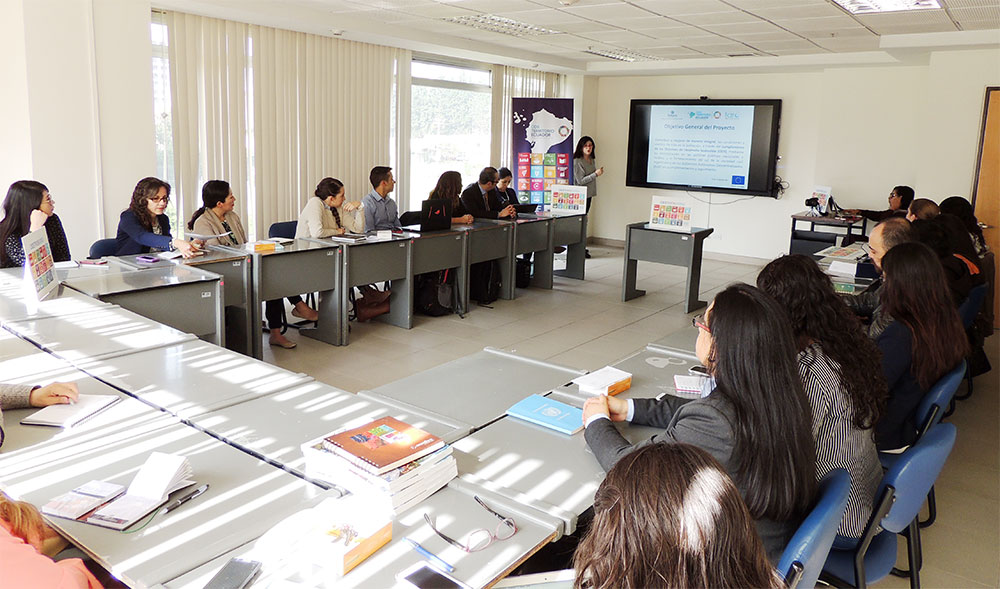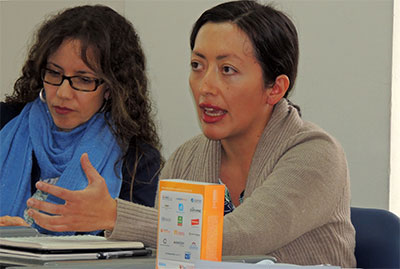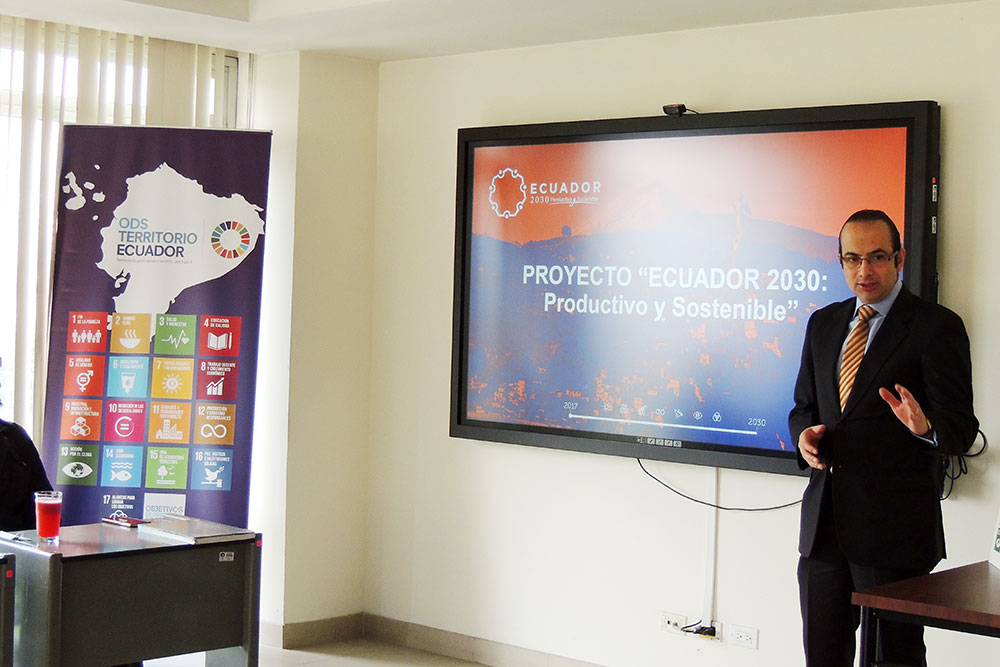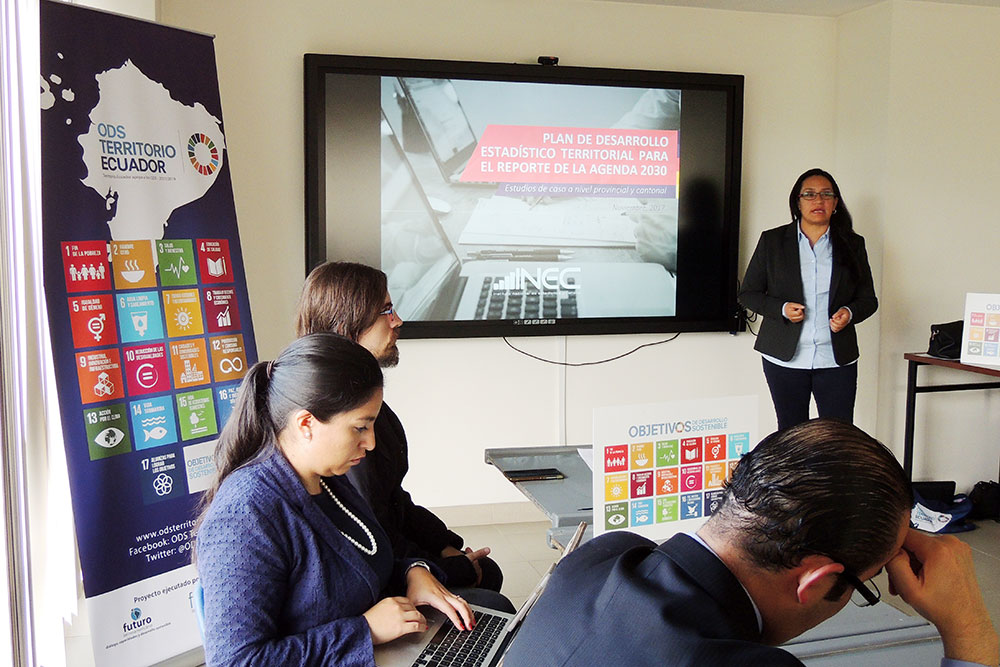
As part of the ODS Territorio Ecuador initiative led by FFLA and Grupo FARO, the “Group for Strategic Thinking on the SDGs” has been recently established, with a focus on participation and multi-sectoriality at the national level. The group brings together relevant policy makers from the public sector, private sector, universities and civil society in order to contribute towards the achievement of SDGs in Ecuador.
The objective of this group is to periodically bring together different stakeholders in a participatory and multi-sectorial space, in order to discuss and generate knowledge that will contribute towards actions to achieve the SDGs in Ecuador. Among the relevant actors are the National Secretariat for Planning and Development (SENPLADES), the National Institute of Statistics and Censuses (INEC), the Ministry of Environment, the Ecuadorian Business Committee, Postgraduate Universities, the Ecuadorian Confederation of Civil Society Organizations, international organisations such as the United Nations Development Programme (UNDP), Food and Agriculture Organization of the United Nations (FAO), Delegation of the European Union for Ecuador, and the Sustainable Development Solutions Network/Yachay Tech.
 During 2017, three meetings were held. The first and the second ones focused on the challenges and opportunities in Ecuador for taking actions that contribute to the implementation of the 2030 Agenda. On November 24, the third meeting of the Strategic Thinking Group was held. It is important to stress that this space, even though it is promoted and facilitated by FFLA and Grupo FARO, pertains to its members; for this reason, in each meeting different issues are presented and discussed, with respect to the activities and outputs by various members in connection to SDG implementation in Ecuador. At the third meeting, several actors presented their contributions to the development of the 2030 Agenda in Ecuador and its territories: INEC presented the Territorial Statistical Development Plan, the Ecuadorian Business Committee presented its project Ecuador 2030: Productivo y Sostenible and the Center for Investigation on Public Policy and Territory (CITE) of FLACSO gave a presentation on the Multidimensional Index of Urban Prosperity, elaborated as per the methodology of UN Habitat and based on investigations carried out in 27 cities in Ecuador.
During 2017, three meetings were held. The first and the second ones focused on the challenges and opportunities in Ecuador for taking actions that contribute to the implementation of the 2030 Agenda. On November 24, the third meeting of the Strategic Thinking Group was held. It is important to stress that this space, even though it is promoted and facilitated by FFLA and Grupo FARO, pertains to its members; for this reason, in each meeting different issues are presented and discussed, with respect to the activities and outputs by various members in connection to SDG implementation in Ecuador. At the third meeting, several actors presented their contributions to the development of the 2030 Agenda in Ecuador and its territories: INEC presented the Territorial Statistical Development Plan, the Ecuadorian Business Committee presented its project Ecuador 2030: Productivo y Sostenible and the Center for Investigation on Public Policy and Territory (CITE) of FLACSO gave a presentation on the Multidimensional Index of Urban Prosperity, elaborated as per the methodology of UN Habitat and based on investigations carried out in 27 cities in Ecuador.
The members of the Strategic Thinking Group do not only share information on their activities linked to their contribution towards the SDGs through such presentations. A matrix compiling information on the activities of each member has been put together by the team of the initiative. During the meeting, the assistants agreed on the importance of sharing this information through the website, social networks and other channels of communication through joint efforts amongst the communication teams of the different entities of the National Group for Strategic Thinking.

At the end of the meeting, the actors agreed that this is an adequate space for reflection and analysis on the state of the SDGs in Ecuador and that it is promoting the articulation and synergy between the different sectors of society for future collaborations. The next meeting will be held in January, giving occasion to SENPLADES to present The National Development Plan and the Ministry of Environment to present its work related to the achievement of the SDGs. As a projection on which steps should be taken next, the idea was raised to start coordinated actions for this Group to contribute to the construction of the Country Report that Ecuador will need to present in front of the United Nations, using this as an opportunity to make visible the articulation of different sectors.

Next to the initiative’s efforts at the national level, the project SDGs Territory Ecuador engages for the implementation of the SDGs at the local level, through the organisation and facilitation of multi-sectorial roundtables, with participation from a high variety of stakeholders at the provincial level. Through their joint commitment, the participating entities come together to get to know the SDGs in detail and adapt them as a tool of developmental planning to their local contexts. During 2017, four such meetings were held in the provinces of Santo Domingo de los Tsáchilas, Napo and Manabí, whilst the first meetings in Cuenca and Galápagos are scheduled for the beginning of 2018.

